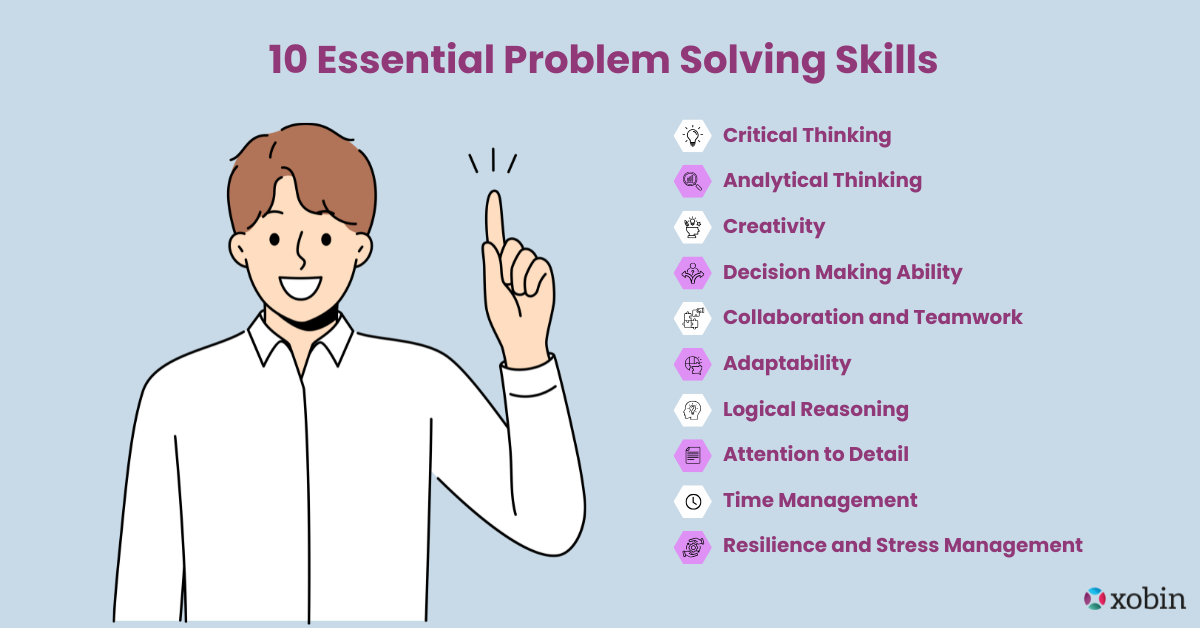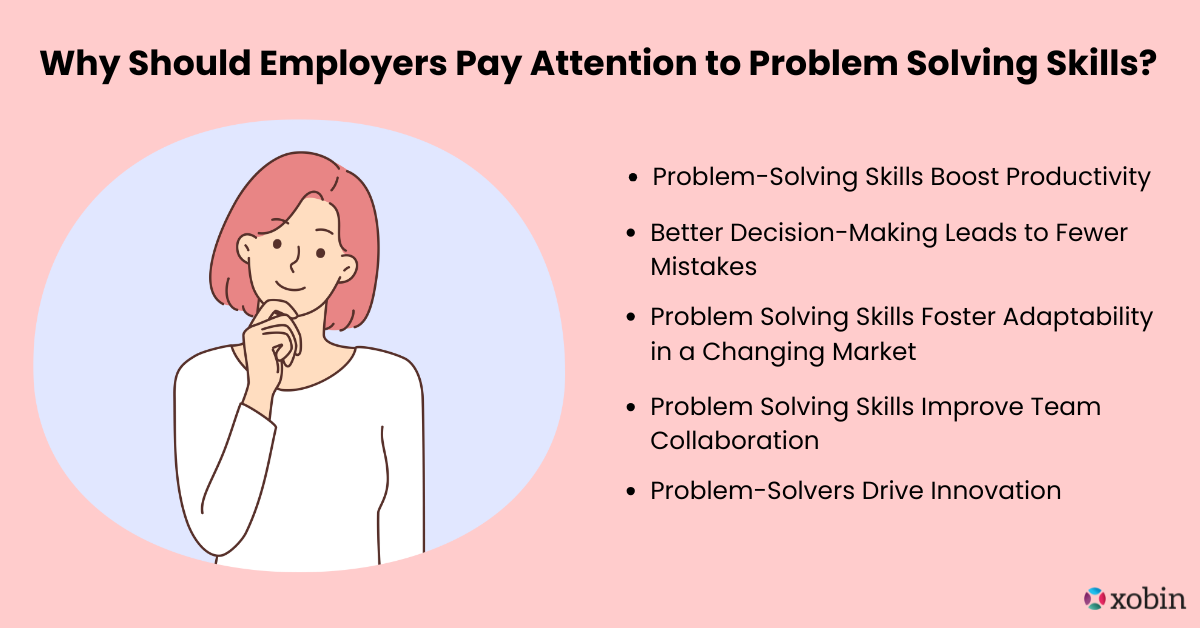Hiring the right candidate isn’t just about technical expertise. Today’s workplaces demand professionals who can analyze problems, think critically, and make informed decisions. These problem-solving skills play a crucial role in ensuring business success. Recruiters often struggle to assess these skills during the hiring process. Fortunately, skills testing helps evaluate a candidate’s ability to think logically, adapt to challenges, and work collaboratively. By identifying these competencies early, companies can hire individuals who contribute to innovation and efficiency. In this blog, we’ll discuss the top 10 problem-solving skills every recruiter should look for.
Table of Contents
10 Essential Problem Solving Skills

1. Critical Thinking
Critical thinking is the ability to analyze facts, identify patterns, and form conclusions based on logical reasoning. It involves questioning assumptions, examining different viewpoints, and making decisions that are both informed and effective. In today’s fast-paced work environment, critical thinking allows employees to make informed decisions quickly. This skill is particularly valuable in roles that require complex decision-making and strategy formulation. Candidates who excel in critical thinking can cut through the noise and make choices that are backed by solid evidence and reasoning.
You can use Critical Thinking Skills Test to assess a candidate’s ability to evaluate situations, spot potential problems, and make well-reasoned decisions. This test challenges candidates with situational and logic-based questions, helping you identify top-tier critical thinkers for your organization.
2. Analytical Thinking
Analytical thinking is the ability to break down complex information into manageable parts, analyze it from different perspectives, and synthesize insights to draw conclusions. This skill requires precision, attention to detail, and logical reasoning. In the workplace, analytical thinking helps employees assess data, identify trends, and uncover solutions to problems that may not be immediately apparent. Candidates with strong analytical thinking abilities can tackle difficult challenges in a structured way, ensuring no stone is left unturned.
Analytical Skills Test is a great tool for measuring how candidates analyze data, think critically about scenarios, and apply logic to solve problems. By testing a candidate’s ability to process complex information, you can ensure you’re hiring individuals who can think critically under pressure.
3. Creativity
Creativity in problem-solving allows candidates to think outside the box and develop innovative solutions. Sometimes, conventional methods won’t work, and companies need employees who can generate fresh ideas and alternative approaches. This skill is particularly important in marketing, design, product development, and leadership roles. A creative problem-solver doesn’t just follow existing methods; they explore new possibilities and experiment with unique solutions.
A Situational Judgment Test (SJT) helps gauge a candidate’s ability to think outside the box and propose innovative solutions to workplace challenges.
4. Decision-Making Ability
Good decision-making skills enable employees to evaluate available options, consider potential risks, and make sound choices quickly. This skill is critical in high-pressure roles such as management, healthcare, and finance, where decisions must be made promptly and effectively. A strong decision-maker balances logic with intuition and remains confident in their choices. Poor decision-making can lead to costly mistakes, inefficiencies, or conflicts, making it essential for recruiters to assess this skill.
Decision-Making Skills Assessment evaluates a candidate’s ability to weigh different alternatives and select the best course of action in complex situations. This test is perfect for identifying candidates who can make sound decisions quickly, even under pressure.
5. Collaboration and Teamwork
Problem-solving is rarely a solo effort. Employees who can collaborate effectively with colleagues, share insights, and work toward common goals are essential in any organization. Strong team players communicate their ideas clearly, listen actively, and resolve conflicts professionally. This skill is crucial in roles that require cross-functional teamwork, such as project management, customer service, and leadership positions.
Psychometric assessment evaluates how well candidates work with others to solve problems, resolve conflicts, and generate ideas. It helps assess how a candidate contributes to team problem solving efforts, which is essential for many roles.
6. Adaptability
Work environments are constantly changing, and companies need employees who can adjust to new challenges, technologies, and work processes. Adaptable employees handle unexpected situations with ease and remain open to learning new skills. This is particularly valuable in fast-paced industries such as technology, healthcare, and startups. Candidates who resist change may struggle in dynamic work environments, while those who embrace it contribute to growth and innovation.
A Personality Assessment combined with a Situational Judgment Test evaluates how well a candidate adapts to change and handles new challenges.
7. Logical Reasoning
Logical reasoning helps employees approach problems methodically and derive conclusions from facts and evidence. This skill is especially important in fields like IT, software development, and engineering, where professionals need to debug errors, develop algorithms, and troubleshoot issues. A candidate with strong logical reasoning skills spot inconsistencies, recognize relationships between concepts, and draw sound conclusions.
Logical Reasoning Test evaluates a candidate’s ability to think logically and apply reasoning to problem solving scenarios. The test includes tasks that require candidates to draw logical conclusions, making it an excellent tool for assessing problem solving abilities.
8. Attention to Detail
A small mistake can lead to significant consequences. Employees with strong attention to detail ensure accuracy and precision in their work, reducing the risk of costly errors. This skill is crucial in fields such as accounting, quality control, and data entry, where accuracy is non-negotiable. A detail-oriented candidate reviews their work thoroughly, catches inconsistencies, and follows instructions carefully to maintain high-quality output.
Attention to Detail Test is designed to identify candidates who can spot inconsistencies, avoid mistakes, and ensure that all aspects of a problem are addressed. It helps assess how well candidates approach complex tasks with precision.
9. Time Management
Solving problems efficiently isn’t just about finding solutions, it’s about doing so within deadlines. Strong time management skills help employees prioritize tasks, stay organized, and maintain productivity. Candidates who manage their time well can handle multiple responsibilities, avoid procrastination, and meet deadlines consistently. This skill is crucial for project managers, sales representatives, and any role that involves juggling multiple tasks.
Time Management Skills Test evaluates how well candidates plan, prioritize, and allocate their time when solving problems. It’s an excellent way to assess a candidate’s ability to work under pressure and meet deadlines while delivering high-quality solutions.
10. Resilience and Stress Management
Stress management is the ability to handle pressure without getting overwhelmed, whereas resilience is the capacity to recover from setbacks. Both are necessary for overcoming obstacles and sustaining performance under pressure when solving problems. Resilient workers have a higher chance of maintaining their concentration and problem-solving skills under pressure. Even in the face of hardship, productivity may be maintained with resilience and stress management.
Stress Management Test measures how candidates handle pressure and setbacks in the problem solving process. It helps identify candidates who can stay calm and focused in high-pressure environments.
Why Should Employers Pay Attention to Problem Solving Skills?

Problem-Solving Skills Boost Productivity
Problems arise everywhere—at work, in communities, and daily life. Finding solutions can feel like solving a puzzle with missing pieces, especially in uncertain and complex situations. That’s why strong problem-solving skills are essential.
According to McKinsey research, organizations in the top quartile for problem-solving capabilities achieve 3.5 times higher total shareholder returns than those in the bottom quartile. This insight, shared by McKinsey’s Chris Bradley and director emeritus Rob McLean, highlights the direct impact of strategic thinking on business success.
Better Decision-Making Leads to Fewer Mistakes
Poor decisions can cost businesses millions. A study by the Association of Certified Fraud Examiners (ACFE) found that organizations lose 5% of their annual revenue due to errors and fraud, many of which stem from poor judgment and decision-making. Employees with strong analytical thinking and logical reasoning can make well-informed decisions, reducing costly mistakes.
For instance, in the financial sector, analysts must evaluate investment risks, market trends, and economic conditions before making recommendations. A lack of critical thinking could result in poor investments, leading to financial losses.
Problem-Solvers Drive Innovation
Companies that cultivate a problem-solving culture often lead in innovation. By encouraging employees to think creatively and strategically, these organizations can identify new market opportunities, develop groundbreaking products, and enhance customer experiences. For instance, Apple’s success is largely attributed to its ability to solve consumer pain points through innovative product designs. The company’s distinctive and ever-evolving organizational model fosters innovation by enabling employees to anticipate customer needs and devise novel solutions, thereby driving business growth and market leadership.
Adaptability in a Changing Market
The business landscape is in constant flux, demanding that individuals and organizations develop the capability to adapt swiftly and confidently. A 2021 survey by PwC revealed that 77% of workers are ready to learn new skills or completely retrain, underscoring the importance of adaptability in the modern workforce.
The COVID-19 pandemic exemplified the critical need for adaptability. Companies that embraced remote work and digital transformation not only survived but often thrived, while those resistant to change faced significant challenges. Employees with strong problem-solving skills were instrumental in navigating uncertainties, implementing remote solutions, and ensuring business continuity.
Improved Team Collaboration and Leadership
Teams with strong problem-solving abilities are better equipped to navigate challenges, leading to more effective collaboration and leadership. In 2024, UK CEOs identified problem-solving as the most valuable skill for employees, surpassing technical abilities and experience. This emphasis on problem-solving highlights its critical role in enhancing team collaboration and leadership within organizations. By fostering strong problem-solving skills, teams can navigate challenges more effectively, leading to improved collaboration and more effective leadership.
Looking for a Candidate with Problem Solving Skills?
Xobin’s extensive skill inventory of skills and job role based tests is customized for each role. It is a perfect tool to enhance your recruitment process and ensure that you select candidates who not only fit the role but excel in solving real-world problems. Incorporating a comprehensive approach to evaluating problem solving will lead to better hiring decisions, improved team dynamics, and a more productive workforce.
Book a personalized demo today, and let Xobin help you evaluate your candidate’s problem solving skills, ensuring you hire the best talent for the role!






